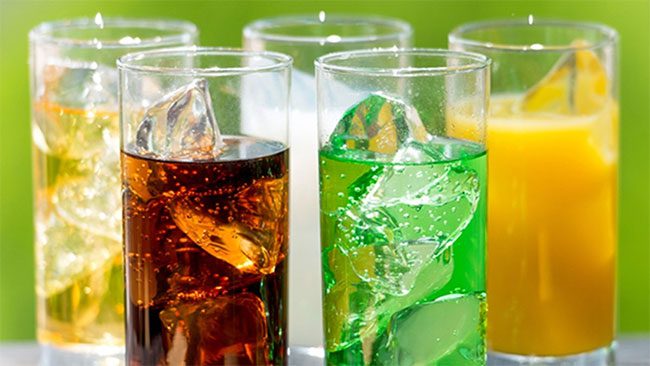In today’s busy life, fast food and sugary drinks are incredibly convenient, reasonably priced, and appealing to people from all walks of life, leading to increased consumption.
Dr. Nguyen Huy Quang, former Director of the Legal Department (Ministry of Health) and Head of the Advisory, Counter-Argument, and Social Assessment Committee at the Vietnam Medical Association, stated that the consumption of soft drinks (the most common type of sugary beverage) in Vietnam has increased sevenfold over the past 15 years, from an average of 6.6 liters per person in 2002 to 46.5 liters per person in 2017, especially among younger groups.
Excessive Sugar Drink Consumption as a Major Health Risk
In an interview, Dr. Dao Thi Hao from the Nutrition Department at the Central Army Hospital 108 in Hanoi noted that sugary drinks provide energy but lack dietary fiber and micronutrients (resulting in “empty calories”). They can create a quick feeling of fullness or thirst relief. However, the sugar content, particularly fructose (a simple sugar), is high, leading to reduced appetite and an increased craving for sugary beverages.
Moreover, excessive consumption of these drinks by children can result in hyperactivity and decreased attention spans. Thus, frequent intake of soft drinks can severely affect users’ physical and mental health.
“A bottle of soda, depending on the type, can contain up to 40-50 grams of sugar, which is double the amount the body needs in a day. Additionally, you are also consuming sugar from other foods. Consequently, drinking sugary beverages can lead to an intake of excessive sugar, exceeding recommended limits,” Dr. Hao explained.
Excess energy accumulates as white fat, leading to weight gain. This type of weight gain typically does not increase muscle mass, with fat often accumulating around the abdomen, making it unsightly.
The expert noted that if you consume more than 20-30 grams of sugar daily, especially from carbonated soft drinks (1-2 cans per day), you are already exceeding the necessary sugar intake.
This poses a risk factor for chronic non-communicable diseases such as lipid metabolism disorders, fatty liver disease, prediabetes, cardiovascular diseases, osteoporosis, obesity, digestive issues, and significantly raises the risk of cancer.

Soft drinks also harbor potential carcinogens.
Soft drinks also contain carcinogenic substances such as methylmadizole. Isabel Drake, a researcher at Lund University in Sweden, has stated that individuals who consume a lot of carbonated drinks are 40% more likely to develop prostate cancer than average.
Don’t Assume Sugar-Free Drinks Are Healthy
In some bottled beverages, consumers may encounter labels stating “no fat,” “no sugar,” “no calories.” This can mislead people into thinking that these products contain none of these substances or only at low levels, which do not affect the body, leading them to consume freely and without limits.
However, Dr. Dao Thi Hao emphasizes that while these beverages do not generate calories, they still contain many sweeteners and additives that enhance the absorption of fats and proteins. They may not provide energy but act as stimulants for the body to store fat. Thus, people may still gain weight.
Understanding nutritional labels correctly will contribute to more informed choices regarding sugary foods and beverages.
“Reading food labels is a useful practice for controlling what types of food, drinks, and chemicals we put into our bodies. As informed consumers, we should develop the habit of reading labels on food products when shopping,” Dr. Hao advised.

Sugary drinks can also create a false sense of fullness, meaning the amount of food consumed might not be sufficient, yet there is a feeling of satiety. (Image: Aboutlawsuits).
Can Excessive Consumption Lead to Addiction?
Nonetheless, it is common for Vietnamese people to drink soft drinks during meals, especially carbonated ones. This type of drink contains a lot of gas, which can cause bloating and discomfort, leading to burping… They can also create a false sense of fullness, meaning that despite not eating enough, one feels full. Additionally, the absorption of nutrients is also negatively impacted.
Children who consume sugary drinks daily will experience changes in their taste preferences, leading to decreased food intake. If children do not eat enough or have a varied diet, it will reduce calcium absorption, impacting their height development.
Another poor habit among Vietnamese parents is giving sugary drinks to children when they are hungry. Dr. Hao pointed out that these drinks only provide a false sense of fullness without any real energy, which can harm children’s stomachs. Parents should replace these drinks with milk or a couple of slices of bread instead of using soft drinks to satisfy their children’s hunger.
Especially when hungry, it is often difficult to control the amount of soft drink consumed. Overconsumption of sugar can lead to feelings of nausea, rapid heart rate, and increased blood pressure… These are signs that the body cannot metabolize the sugar, commonly referred to as “sugar high.”
Regular consumers may develop a “dependency” on sugary drinks. Dr. Hao explained that sugar in soft drinks stimulates the release of dopamine (a neurotransmitter in the brain), making the body feel more joyful and energetic. Over time, this can lead to dependency on such beverages.
Some signs of “addiction” to soft drinks or energy drinks include: Intense cravings for these drinks; a strong liking for their smell; feeling alert and refreshed after consumption; inability to control the amount of drink consumed.
The expert also advises that the simplest way to combat “addiction” is to replace sugary drinks with healthier alternatives. Some healthier options include green tea, low-sugar fruit juices, herbal teas, fermented teas, or chewing gum…


















































